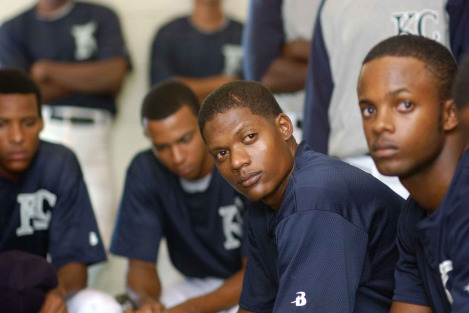Sugar
Algenis Perez Soto, Reyniel Rufino, and Ellery Porterfield star in a film written and directed by Anna Boden and Ryan Fleck.

In the generally conservative genre of sports films, we’ve come to expect certain cliches – beyond just the triumphant climactic game – and character development arcs. It’s almost as if the rulebook-bound nature of sports itself bleeds over into its filmic dramatizations. Occasionally, though, the genre is inventively twisted into something deeper, less predictable, and artsy, in the case of films such as Bang the Drum Slowly, Raging Bull, and The Wrestler.
Sugar, the remarkable, naturalistic, and hypnotic tale of a promising young pitcher from the Dominican Republic, belongs in that rare category. Not incidentally, this project from writer-directors Anna Boden and Ryan Fleck (Half Nelson) is clearly one of the best films of the last year, whether or not its subtlety and soft-edged maverick qualities ever earn it the attention it deserves.
Deep into the film, a Spanish language version of Leonard Cohen’s modern-day secular hymn “Hallelujah” seems to sharpen the emotional focus of the tale. Reprised during the final credits, the song becomes an unofficial anthem (yet another link to the anthem-driven – “Streets of Laredo” – against-type baseball saga, Bang the Drum Slowly). “Your faith was strong, but you needed proof,” goes the lyric, and our hero’s wandering path.”Your faith was strong, but you needed proof,” goes the lyric, and our hero’s wandering path.
Fans of both baseball and thoughtful cinema should warm to the film, which devotes plenty of time and pictorial graces to the art and pace of the sport, from unique angles. Young Dominican baseball hopeful Miguel “Sugar” Santos (played with a quiet, laconic power by baseball player Algenis Perez Soto) is funneled through the ranks of the minor leagues, sent into the intriguing and alienating landscape of the United States. Settling in the home of a corn-fed family in Iowa, he wrestles with dreams of glory, struggles with consistency in his game, cultural dissociation, and more generalized soul-searching.
Specifics of the story are one thing, the calm mastery of the filmic telling another. Boden and Fleck, aided by the dazzling, dreamy, and semi-documentary-like work of cinematographer Andrij Parekh, take their time. They wind their way through rolling scenes of gentle humor and poignancy, using a cinematic style that invites us inside the sweet but troubled mind of our protagonist. They are careful not to wrap things up too tidily, preferring to embrace the ambiguity of life and art, off to the side of the rulebooks.



